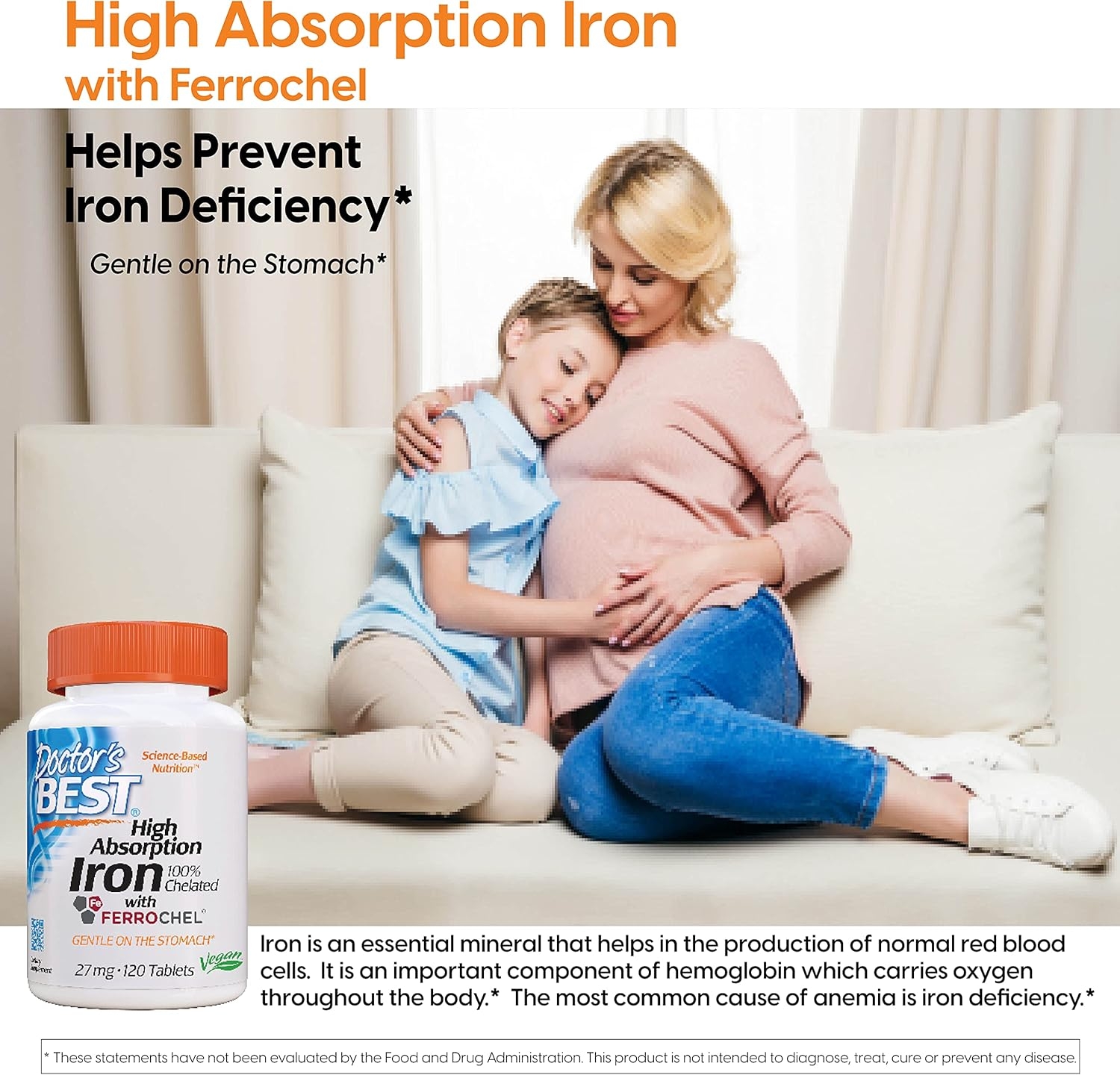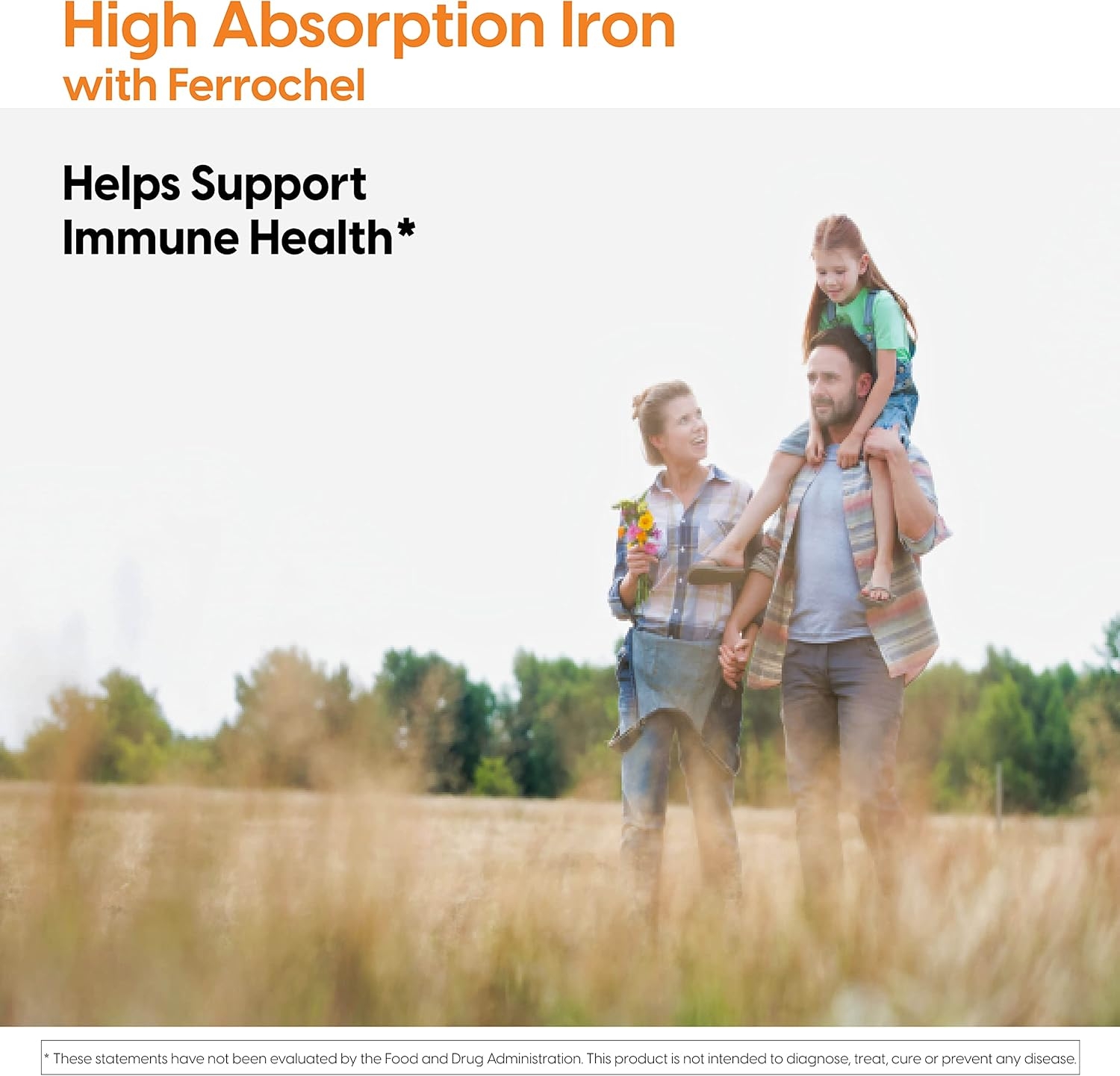- DOCTOR’S BEST HIGH ABSORPTION IRON WITH FERROCHEL – contains chelated iron to help increase bioavailability. Chelation helps iron to be optimally absorbed by our body and is well-tolerated by the digestive system.*
- ESSENTIAL IRON – an essential mineral that helps in the production of normal red blood cells. The most common cause of anemia is iron deficiency. It is an important component of hemoglobin which carries oxygen throughout the body.*
- BOOST IRON LEVELS – helps to build your iron levels, supports immune healthy and support cell production. Essential component of hemoglobin, the protein that carries oxygen from lungs to all body tissues and cells. Iron supports normal red blood cell production.*
- EASY TO DIGEST – High Absorption Iron 27 mg contain a gentle, form of iron known as Ferrochel, a patented, fully reacted chelated ferrous bisglycinate. Ferrochel Iron is chelated with two glycines providing high absorption and increased tolerability.* Gentle on your stomach iron supplement for women and men.*






From the manufacturer

 *These statements have not been evaluated by the FDA. This product is not intended to diagnose, treat, cure or prevent any disease.
*These statements have not been evaluated by the FDA. This product is not intended to diagnose, treat, cure or prevent any disease.
Doctor’s Best High Absorption Iron with Ferrochel contains chelated iron to help increase bioavailability. Chelation helps iron to be optimally absorbed by our body, and is well-tolerated by the digestive system.*
Iron is an essential mineral that helps in the production of normal red blood cells. It is an important component of hemoglobin which carries oxygen throughout the body.*
Iron plays an important role in the metabolism of folic acid, which is important for fetal nervous system development.* Anemia in pregnant women has been linked to low birth weight and premature birth.* The most common cause of anemia is iron deficiency.*
|
|
|
|
|---|---|---|
What are the benefits of High Absorption Iron?
|
Why take High Absorption Iron?The most common cause of anemia is iron deficiency.
|
How does if work?
|
CLINICAL STUDIES
Another clinical trial included forty infants, 6 to 36 mo old, with iron-deficiency (hemoglobin < 11 g/dL), matched and assigned to two groups. One group received FeS0(4) and the other received ferrous bisglycinate chelate at a dose of 5 mg of Fe daily per kilogram of body weight for 28 d. Both groups had significant hemoglobin increases (P < 0.001), but only the group treated with ferrous bisglycinate chelate had significant increases in plasma ferritin. Apparent iron bioavailability was calculated at 26.7% for FeS04 and 90.9% for ferrous bisglycinate chelate. The study concluded that ferrous bisglycinate chelate is the iron of choice for treatment of infants with iron-deficiency because of its high bioavailability and good regulation.3
Another study measured the effect of ferrous bisglycinate as fortificant in brown bread compared with that of electrolytic iron (Fe) among Fe-deficient school children in a randomized controlled trial. Children (n 160), aged 6-11 years, with serum ferritin <20 mcg/l, were randomly assigned to one of three treatment categories: (i) standard unfortified bread; (ii) bread with electrolytic Fe as fortificant; and (iii) bread with ferrous bisglycinate as fortificant. Hemoglobin, serum ferritin, serum Fe and transferrin saturation were measured at baseline and at the end of the intervention. Significant treatment effects were observed for hemoglobin, serum Fe and transferrin saturation in the ferrous bisglycinate group, but not in the electrolytic Fe group. Overall, ferrous bisglycinate as Fe fortificant performed better than electrolytic Fe in a group of Fe-deficient school children over a period of 7.5 months.
A different study compared effects on ferritin concentration of daily supplementation with ferrous sulfate or iron bis-glycinate chelate in schoolchildren with iron deficiency but without anemia. Two hundred schoolchildren from public boarding schools in Mexico City who had low iron stores as assessed by serum ferritin concentration but without anemia were randomly assigned to a daily supplement of 30 mg/day of elemental iron as ferrous sulfate or iron bis-glycinate chelate for 12 weeks. Iron status was evaluated at baseline, one week post-supplementation (short term), and 6 months (medium term) after supplementation.
The study concluded that supplementing with 30 mg/d of iron bisglycinate chelate for 90 days, showed positive effects on increasing ferritin concentration in schoolchildren with low iron stores, and this effect persisted 6 months after supplementation.
Another study attempted to study the effects of iron supplementation in marginally low birth weight (MLBW) infants. In a randomized controlled trial, 285 healthy, MLBW infants received iron supplements at a dose of 0 (placebo), 1, or 2 mg/kg per day between 6 weeks and 6 months of age. Hemoglobin levels, ferritin levels, transferrin saturation, mean cell volume, and transferrin receptor levels were analyzed at 6 months. Iron supplementation resulted in significant dose-dependent effects on hemoglobin and all iron status indicators at 6 months. The study concluded that iron supplementation at 2 mg/kg per day from 6 weeks to 6 months effectively reduces iron deficiency risks, with no short-term adverse effects on morbidity or growth.
Iron is an important element participating in multiple metabolic processes, including the synthesis of catecholamines. Iron deficiency (ID) is particularly insidious on brain maturation and cognitive functions during school age. A study tested whether iron affected working memory (WM) in 8-10-year-old ID children. Event-related potentials (ERPs) were recorded using a Sternberg-type task in control, ID and ID-iron supplemented children. ID children showed less correct answers and diminished ERP amplitude in frontal, central, parietal and temporal regions compared to control children. After iron supplementation, behavioral and ERP differences disappeared between ID and control children. Considering that WM is fundamentally related to attention ability, the results confirm and reinforce previous observations: ID severely diminishes attention and WM, while iron supplementation substantially restores cognitive capabilities.
Another study aimed to examine the relation between iron status and cognitive abilities in young women. A blinded, placebo-controlled, stratified intervention study was conducted in women aged 18-35 y of varied iron status, randomly assigned to receive iron supplements or a placebo. Cognition was assessed by using 8 cognitive performance tasks (from Detterman’s Cognitive Abilities Test) at baseline (n = 149) and after 16 wk of treatment (n = 113). After treatment, a significant improvement in serum ferritin was associated with a 5-7-fold improvement in cognitive performance, whereas a significant improvement in hemoglobin was related to improved speed in completing the cognitive tasks. Iron status is a significant factor in cognitive performance in women of reproductive age. Severity of anemia primarily affects processing speed, and severity of iron deficiency affects accuracy of cognitive function over a broad range of tasks. The study concluded that the effects of iron deficiency on cognition are not limited to the developing brain.
A separate study aimed to identify the impact of weekly iron supplements on the attention function of female high school students. This was a blind, controlled, clinical trial study, involving 200 female students chosen randomly. The case group was treated with 50 mg of ferrous sulfate twice a week for 16 weeks. Both groups were compared for attention, iron status and erythrocyte indices. The study concluded that oral iron supplements (50 mg twice a week for 16 weeks) improved the attention span and hematologic indices of female high school students.
Other researchers conducted a randomized placebo-controlled trial to investigate effects of iron (Fe) supplementation on Fe status and performance in non-anemic female rowers. Forty rowers were randomized to receive either 100 mg/d FeSO4 (n = 21) or placebo (n = 19) using a double-blind design. Thirty-one (n = 15 Fe, 16 placebo) completed the 6-wk trial. Fe status (hemoglobin, serum ferritin, and soluble transferrin receptor), body composition, and laboratory tests of physical performance (4-km time trial, V˙O2peak, energetic EF, and blood lactate) were assessed at baseline and after training. The researchers concluded that female rowers with depleted Fe stores who consumed supplemental Fe improved their Fe status and energetic EF during endurance exercise. These results are important for athletes whose dietary patterns and physical training increase their risk of iron deficiency without anemia and suggest that Fe supplementation may maximize endurance training benefits.
*These statements have not been evaluated by the FDA. This product is not intended to diagnose, treat, cure or prevent any disease.
Product Description
Doctor’s Best High Absorption Iron Tablet with Ferrochel, Gentle on The Stomach, Immune Health, Blood Health, 27 mg













